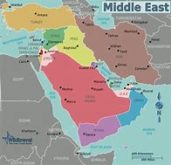RFL/RE – Tehran says it will “counter” U.S. threats against after President Donald Trump acknowledged he came within minutes of executing military strikes in Iran in retaliation for the shooting down of a U.S. Navy drone.
Speaking on June 22 to the Tasnim news agency, which is linked to Iran’s Islamic Revolutionary Guards Corps (IRGC), Foreign Ministry spokesman Abbas Musavi praised the downing of the drone and said the Islamic republic would never allow its territorial integrity to be violated.
“We are ready to counter any threats against the [territorial] integrity of the Islamic Republic of Iran,” he said.
“Our decisions do not hinge on their decisions and we will counter any aggression whether it mingles with threats or not,” Musavi added.
Tensions between Tehran and Washington have spiked since an Iranian missile destroyed a U.S. Global Hawk surveillance drone on June 20.
Iran says the drone was shot down over its territory while Washington said it occurred in international airspace over the Strait of Hormuz.
In a series of tweets on June 21, and then later in the day in an interview with NBC television, Trump said the United States came within 10 minutes of launching retaliatory military strikes before calling off the move because the casualty count could have run into triple digits.
“We were cocked & loaded to retaliate,” he said.
The nearly executed attack was the closest the United States has come to a direct military strike on Iran in the year since the administration pulled out of a 2015 accord with Tehran and other world powers that was intended to curb the Middle Eastern country’s nuclear program. Iran claims the program is only for civilian purposes.
The United States also has blamed Tehran for a series of recent attacks on oil tankers near the Strait of Hormuz — including two tankers that were attacked in the Gulf of Oman on June 13.
The U.S. envoy on Iran, Brian Hook, said on June 21 that it is “important we do everything” to de-escalate tensions with Iran.
“Our diplomacy does not give Iran the right to respond with military force,” Hook said in the Saudi capital, Riyadh. “Iran needs to meet our diplomacy with diplomacy and not military force.”
Colin Kahl, the former national security adviser to then-Vice President Joe Biden, said that U.S. actions to take out even a few targets inside Iran — such as radars or air defense systems — would likely prompt a “large-scale” response by Tehran.
“A limited strike could still produce an unlimited conflict,” Kahl said during a conference call on June 21 to discuss the developments.
In a June 21 statement, Iran’s Foreign Ministry said that “even some parts of the drone’s wreckage have been retrieved from Iran’s territorial waters.”
Later, Iranian state TV released images of what it said were “retrieved sections of a U.S. military drone.”
General Amir Ali Hajizadeh, the head of the IRGC’s aviation division, told Iranian state TV that Iran refrained from shooting down a U.S. Navy Boeing P-8 Poseidon plane with 35 people on board that he said was accompanying the downed drone.
On June 22, the United Arab Emirates’ General Civil Aviation Authority said it had instructed airlines registered in the country to take necessary measures given current risks in the region.
Operators should “evaluate the affected flying zones and…put in place the necessary measures to avoid operating in areas that may subject civil aviation operations to danger,” the authority said.
The announcement came after major international airlines — including British Airways, Australia’s Qantas, Dutch carrier KLM, Germany’s Lufthansa, Emirates, Malaysian Airlines, and Singapore Airlines — said a day earlier that they were suspending flights over the Strait of Hormuz.
The Federal Aviation Administration (FAA), the U.S. aviation authority, also has issued an emergency order banning U.S. carriers from flying in Iranian airspace over the Strait of Hormuz and Gulf of Oman.
According to a U.S. official who spoke to the AP, the military strikes halted by Trump were recommended by the Pentagon and were among the options presented to senior administration officials.
Officials said Trump had initially approved attacks on several Iranian targets, including radar and missile batteries, The New York Times reported.
That report said the strikes were to take place just before dawn on June 21 to minimize the risk to Iranian military personnel or to civilians.
 Shabtabnews In this dark night, I have lost my way – Arise from a corner, oh you the star of guidance.
Shabtabnews In this dark night, I have lost my way – Arise from a corner, oh you the star of guidance.


